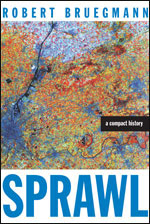Review: Bruegmann, Sprawl
 Chicago Life recently reviewed Robert Bruegmann’s Sprawl: A Compact History: "At a recent panel discussion at the prestigious Chicago Architecture Foundation, the distinguished Doug Kelbaugh, dean of the University of Michigan’s School of Architecture, described the book Sprawl: A Compact History as the most dangerous book he as read. The book was written by the also very distinguished Robert Bruegmann, professor of architecture at the University of Illinois at Chicago. The word ‘dangerous’ suggests that something is very wrong with this book. In fact, the book, which is short and easily consumed, turns conventional wisom on its head suggesting that ‘low-density scattered, urban development without systematic large-scale or regional public land-use planning,’ in other words sprawl, is not all that bad."
Chicago Life recently reviewed Robert Bruegmann’s Sprawl: A Compact History: "At a recent panel discussion at the prestigious Chicago Architecture Foundation, the distinguished Doug Kelbaugh, dean of the University of Michigan’s School of Architecture, described the book Sprawl: A Compact History as the most dangerous book he as read. The book was written by the also very distinguished Robert Bruegmann, professor of architecture at the University of Illinois at Chicago. The word ‘dangerous’ suggests that something is very wrong with this book. In fact, the book, which is short and easily consumed, turns conventional wisom on its head suggesting that ‘low-density scattered, urban development without systematic large-scale or regional public land-use planning,’ in other words sprawl, is not all that bad."
The first major book to strip urban sprawl of its pejorative connotations, Sprawl offers a completely new vision of the city and its growth. Bruegmann leads readers to the powerful conclusion that "in its immense complexity and constant change, the city—whether dense and concentrated at its core, looser and more sprawling in suburbia, or in the vast tracts of exurban penumbra that extend dozens, even hundreds, of miles—is the grandest and most marvelous work of mankind."
Read an excerpt.